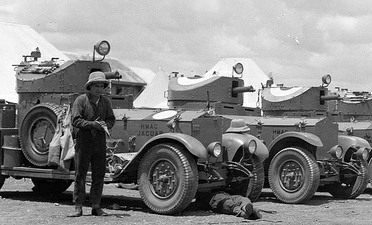Pages in Section 6

The Arab Rebellion- Strikes, Ambushes and Chaos
ii. The Arab Rebellion- Strikes, Ambushes and Chaos
ii. Creation of the Notrim
iii. The Peel Commission
On 18th. May, 1936, when the British government approved a further schedule of 4,500 Jewish immigrants,the threatened Arab strike took place.
Trouble escalated beyond strike action. Arabs assaulted Jews and burnt their crops. They wounded police officers. On 28th May in Jerusalem, British Constable Robert Alexander Bird was murdered by four armed Arabs. An Arab Detective Inspector Ahmed Naif was assassinated after a previous failed attempt at his life.
 The photo shows patrol cars used by the Police during the Troubles
The photo shows patrol cars used by the Police during the Troubles
Violent incidents and defensive measures increased. A favourite Arab tactic was the ambush. On rounding a bend on a narrow mountain track, security forces would find a rock barrier across the road or track in front of them, usually placed where it was impossible to turn their vehicle. If they managed to turn and return the way they had come, however, they would find another hastily erected road block barring their way. On attempting to remove one or other of the barriers, the patrol party would be subjected to sniper fire. Since the patrols were armed with Lewis Guns one policeman would return fire while the rest removed the road block.
During July and August, 1936, road blocks and ambushes numbered some five per day. Probably the worst disaster for the police occurred on 9th September, 1936, A report that a Jewish vehicle had been ambushed lured a vehicle containing four British constables, Raymond Owen Elliott, William Frederick Barr, Forest James Morrison Fletcher and Frederick John Thomas Kettel, to a spot near Rosh Pina in Galilee. Instead of finding a vehicle awaiting rescue, the police found themselves ambushed by a gang of at least 70. The police officers fought to the last bullet but were eventually all killed. A month later, another British Police Constable, Hugh Burnett Morrison, was also killed in another ambush.
A favourite practice of the Arabs was mining the Palestine Railway system. (See next Page)
Acre Police Station was also attacked during this period but was successfully defended.
A number of Arab leaders were arrested and detained at Auja el Hafr in the Negev desert near the Egyptian border. Other agitators were either exiled from their home towns of confined to their home towns. Emergency Regulations were put in place providing the death sentence or life imprisonment for shooting at a member of H.M.Forces or a member of the Police Force. Provisions were also made for the demolition of houses used for shootings, bombings or harbouring rebels. In Jerusalem there was a nightly curfew for all except for people such as doctors whose occupations took them out at night.
The strike was halted mainly due to the intercession of four Arab Sovereigns. As a result of the intercession, the British Government formed a Royal Commission headed by Lord Peel to investigate Palestine's problems.
On 11th November 1936 Royal Commission arrived in Jerusalem. (See two pages further on - The Peel Commission )
For a while Palestine began to return to normal except for internecine strife amongst leading Arab notables. Between May 1936 and July 1937 when the Royal Commission publishing its findings , six Arab policemen and twelve leading Arab leaders were assassinated. One of those murdered in April 1937 was Salim Basta, the brilliant Assistant deputy Superintendent in Haifa, who had been so instrumental in bringing down the Black Hand.
After the Peel Commission published its report, violent incidents and defensive measures increased. Arabs resorted to sniping, bombing and mine laying, a favourite target being the Palestine Railway system.
A number of Arab leaders were arrested and detained at Auja el Hafr in the Negev desert near the Egyptian border. Emergency Regulations providing the death sentence or life imprisonment for shooting at a member of H.M.Forces or a member of the Police Force were published. Provisions were also made for the demolition of houses used for shootings, bombings or harbouring rebels.